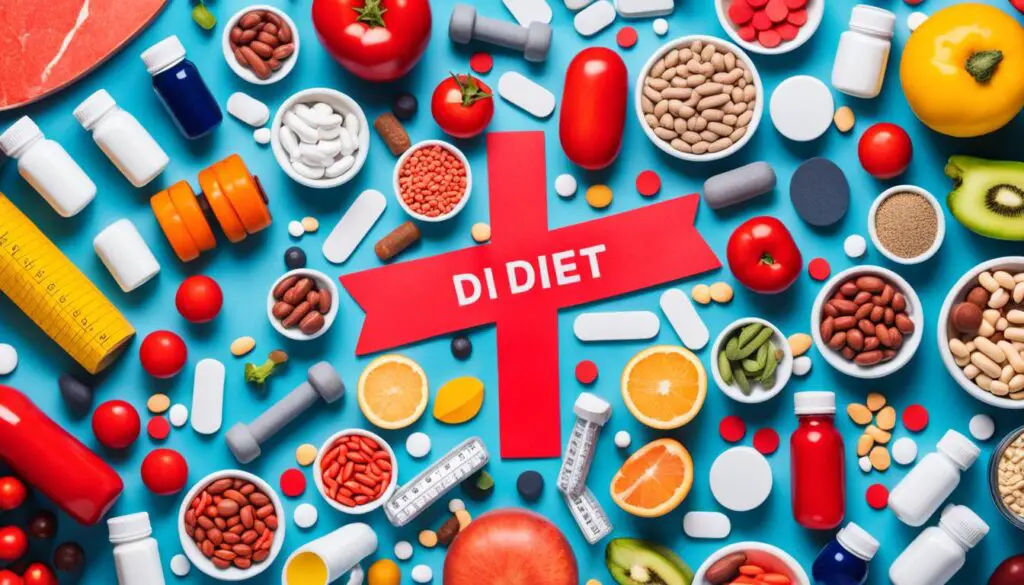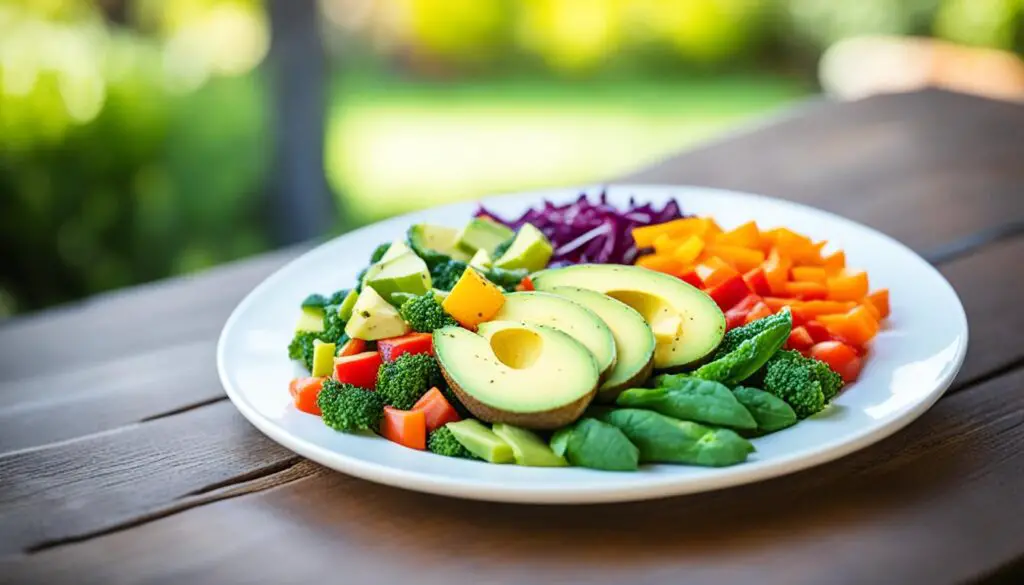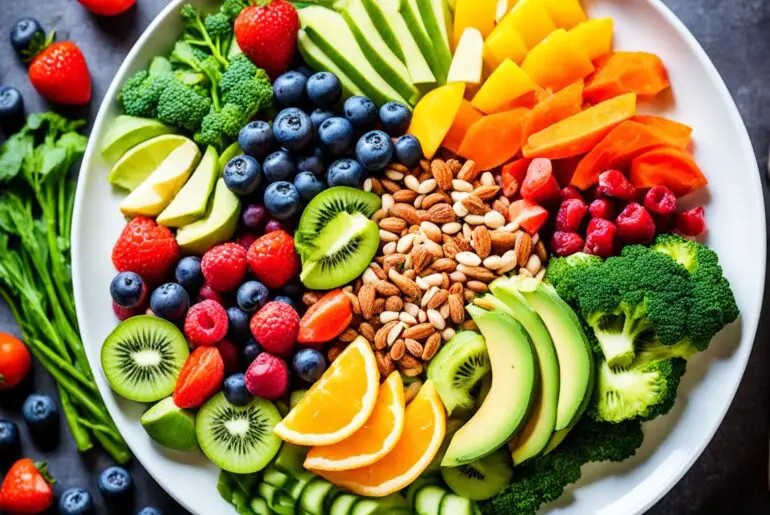Did you know that the HCG diet is not approved by the FDA for weight loss? Contrary to popular belief, this diet, which involves severe calorie restriction and the use of the hormone human chorionic gonadotropin (HCG), may not be as effective or safe as it claims to be.
In recent years, the HCG diet has gained popularity for its promise of rapid weight loss. However, the FDA has warned against the use of HCG for weight loss, stating that it is not safe or effective. HCG is a hormone produced during pregnancy and is often used as a prescription medication for fertility issues. It is not approved for over-the-counter use and has not been proven to work for weight loss.
The HCG diet typically involves severe calorie restriction, with recommended intake as low as 500 to 800 calories per day. While this may result in short-term weight loss, it comes with potential risks such as gallstone formation and electrolyte imbalances. Moreover, the weight loss experienced on the HCG diet is primarily due to calorie restriction, not the HCG hormone itself.
It’s important to understand the realities of the HCG diet and debunk the myths surrounding rapid weight loss. Safe and effective weight loss strategies involve making healthy changes to your diet and increasing physical activity.
Key Takeaways:
- The HCG diet is not approved by the FDA for weight loss.
- The weight loss on the HCG diet is primarily due to severe calorie restriction, not the HCG hormone itself.
- Severe calorie restriction on the HCG diet comes with potential risks and side effects.
- Safer ways to lose weight include making healthy changes to your diet and increasing physical activity.
- Consult with a healthcare professional for personalized guidance on a safe weight loss plan.
The Truth About HCG Diet Myths
When it comes to weight loss myths, the HCG diet often takes the spotlight. Many people believe that HCG, or human chorionic gonadotropin, is the secret to rapid weight loss. However, the truth is quite different.
The weight loss experienced on the HCG diet is primarily due to severe calorie restriction, not the HCG hormone itself. While it’s true that the HCG hormone is naturally produced during pregnancy and has important roles in fertility, it has not been proven to have any significant impact on weight loss beyond calorie restriction.
The U.S. Food and Drug Administration (FDA) has issued warnings against using over-the-counter HCG weight-loss products, as they are not safe or effective for weight loss. These products are often labeled as “homeopathic,” but this does not make them safe. It’s important to be aware of the misconceptions surrounding the HCG diet and understand that there are safer and more sustainable ways to lose weight.
Instead of relying on the HCG diet and its associated myths, it’s crucial to focus on evidence-based approaches to weight loss. Making healthy changes to your diet and incorporating regular physical activity are key strategies for achieving long-term weight loss. Consult with a healthcare professional for personalized guidance and support on a safe and sustainable weight loss journey.
The Risks of the HCG Diet
https://www.youtube.com/watch?v=G6pvggTGUCA
Following the HCG diet and consuming only 500 calories a day can have serious health risks. This level of calorie restriction can lead to gallstone formation, irregular heartbeat, and nutrient deficiencies. Additionally, side effects of the HCG hormone itself include fatigue, irritability, restlessness, depression, fluid buildup, and swelling of the breasts in males. There is also a risk of blood clots forming and blocking blood vessels. It’s important to understand the potential risks associated with the HCG diet before considering it as a weight loss option.
HCG Diet Risks
The HCG diet is not without its risks. With severe calorie restriction, individuals following the diet are at risk for developing gallstones. The body’s metabolism slows down in response to low-calorie intake, leading to a decrease in bile production. This stagnant bile can crystallize and form gallstones over time.
Furthermore, the drastic reduction in calorie intake on the HCG diet can lead to an irregular heartbeat, known as arrhythmia. This is a result of electrolyte imbalances in the body, which can be caused by inadequate nutrition.
Nutrient deficiencies are also a concern on the HCG diet. With such limited food choices and calorie intake, individuals may not be getting enough essential vitamins and minerals to support their overall health. This can lead to fatigue, weakness, and a weakened immune system.
Side Effects of the HCG Hormone
In addition to the risks associated with calorie restriction, the HCG hormone itself can cause side effects. Fatigue, irritability, restlessness, and depression are common symptoms experienced by individuals using HCG. These hormonal changes can disrupt mood and overall well-being.
Fluid buildup, known as edema, is another side effect of the HCG hormone. This can lead to swelling in various parts of the body, including the legs, ankles, and even the breasts in males.
There is also a risk of blood clots forming and blocking blood vessels when using HCG. This can be life-threatening and may lead to serious complications.
“The HCG diet may promise rapid weight loss, but it comes with significant risks. Severe calorie restriction and the use of the HCG hormone can have detrimental effects on your health. It’s essential to consider the potential risks and explore safer, more sustainable ways to achieve weight loss.”
The Importance of Safety and Long-Term Health
While rapid weight loss may be tempting, it’s crucial to prioritize your safety and long-term health. The risks associated with the HCG diet outweigh any potential short-term benefits. Opting for a more balanced and sustainable approach to weight loss is the key to achieving and maintaining a healthy body.
Consulting with a healthcare professional or registered dietitian can provide personalized guidance and support to help develop a safe and effective weight loss plan. They can help you establish realistic goals, adopt healthier eating habits, and incorporate regular physical activity into your lifestyle.
| Health Risk | Potential Consequences |
|---|---|
| Gallstone Formation | Obstruction of the bile duct, cholecystitis, requiring surgical removal of the gallbladder |
| Irregular Heartbeat | Arrhythmia, increased risk of cardiovascular complications |
| Nutrient Deficiencies | Weakened immune system, fatigue, weakness, impaired overall health |
| Side Effects of HCG Hormone | Fluid buildup, mood swings, swelling of breasts in males, potential blood clots |
Debunking Fad Diet Myths

Fad diets have gained popularity for their promises of rapid weight loss, but the truth is that these diets are often unsustainable and unsafe. They often rely on extreme measures such as severe calorie restriction or the elimination of entire food groups, which can lead to nutrient deficiencies and other health issues. Instead of falling for the allure of fad diets, it’s important to focus on long-term, sustainable lifestyle changes that promote overall health and steady weight loss.
Contrary to popular belief, rapid weight loss myths perpetuated by fad diets are not the key to achieving lasting results. Instead, it is crucial to prioritize a balanced approach to nutrition, as well as engaging in regular physical activity.
Consulting with a healthcare professional can provide personalized guidance on a healthy and safe weight loss plan that is tailored to your specific needs. They can help you create a realistic and achievable plan that will not only help you lose weight but also improve your overall well-being.
The Dangers of Fad Diets
Fad diets promising rapid weight loss often come with risks and potential health complications. By depriving the body of essential nutrients and calories, these diets can lead to fatigue, muscle loss, weakened immune function, and even nutrient deficiencies.
“Fad diets often offer a quick fix, but they fail to address the underlying factors that contribute to weight gain and unhealthy eating habits. They create a cycle of short-term weight loss followed by weight regain.”
– Dr. Jane Davis, Registered Dietitian
Instead of subjecting your body to extreme diets, focus on nourishing it with a variety of whole foods, including fruits, vegetables, lean proteins, and healthy fats. These nutrient-rich foods provide the energy and essential nutrients your body needs to function optimally and support a healthy weight.
The Reality of Sustainable Weight Loss
The key to achieving sustainable weight loss lies in making healthy lifestyle changes that you can maintain in the long run. Rather than relying on drastic measures, focus on creating a balanced eating plan that includes a variety of foods from different food groups.
- Incorporate nutrient-dense foods:
- Fruits and vegetables
- Whole grains
- Lean proteins
- Healthy fats
Achieving and maintaining a healthy weight is a journey that requires patience, consistency, and a focus on overall well-being. By embracing a balanced approach to nutrition and exercise, you can achieve long-term success and improve your overall quality of life.
The Importance of Balanced Nutrition
One of the misconceptions surrounding the HCG diet is the belief that extremely low-calorie diets are effective for weight loss. However, severely limiting calorie intake can lead to nutrient deficiencies and other health problems. Instead of focusing on extreme calorie restriction, it’s important to prioritize balanced nutrition.
A healthy, balanced diet includes a variety of whole grains, fruits, vegetables, lean proteins, and healthy fats. This provides the body with the necessary nutrients for optimal health and sustainable weight loss. By making healthy food choices and following a balanced diet, you can fuel your body properly and support overall well-being.
Benefits of Healthy Food Choices
Choosing healthy food options as part of a balanced diet offers numerous benefits. Consuming whole grains, such as brown rice and whole wheat bread, provides fiber, which aids digestion and promotes a feeling of fullness, helping with weight management.
Fruits and vegetables are rich in vitamins, minerals, and antioxidants that support overall health. These nutrient-packed foods can help strengthen the immune system, reduce the risk of chronic diseases, and improve digestion.
Lean proteins, such as chicken, fish, and legumes, are essential for muscle growth and repair. They also help to keep you feeling satisfied, reducing the likelihood of overeating.
Healthy fats, such as avocados, nuts, and olive oil, are important for heart health and provide essential fatty acids that the body needs for hormone production and nutrient absorption.
The Role of a Balanced Diet in Weight Loss
A balanced diet plays a crucial role in weight loss. Rather than focusing solely on calorie intake, a balanced diet ensures that your body is getting all the necessary nutrients it needs to function properly. This helps to maintain energy levels, support physical activity, and promote a healthy metabolism.
Additionally, a balanced diet helps to prevent nutrient deficiencies that can occur with restrictive diets. When the body lacks essential vitamins and minerals, it can lead to fatigue, weakened immunity, and other health issues.
By nourishing your body with a variety of nutrient-dense foods, you can achieve sustainable weight loss while also supporting your overall health and well-being.
Having a balanced diet is crucial for maintaining a healthy weight and preventing nutritional deficiencies. Emphasize healthy food choices that provide essential nutrients, such as whole grains, fruits, vegetables, lean proteins, and healthy fats. By prioritizing balanced nutrition, you can support your weight loss goals and improve your overall health.
| Nutrient | Food Sources |
|---|---|
| Protein | Chicken, fish, eggs, tofu, legumes |
| Carbohydrates | Whole grains, fruits, vegetables |
| Fiber | Whole grains, fruits, vegetables, legumes |
| Healthy Fats | Avocados, nuts, seeds, olive oil |
| Vitamins and Minerals | Fruits, vegetables, nuts, seeds |
The Role of Carbohydrates in Weight Loss

When it comes to weight loss, low-carb diets are often hailed as the ultimate solution. While it’s true that reducing your carbohydrate intake can lead to initial weight loss, it’s important to understand the role carbohydrates play in fueling our bodies, especially our brain.
Carbohydrates are an essential source of energy for our body, providing glucose, a vital fuel for our brain. Severely restricting carbohydrate intake can have negative effects on brain function and overall energy levels.
Instead of completely eliminating carbohydrates from your diet, it’s important to choose complex, whole grain carbohydrates that provide sustained energy and valuable fiber. This includes foods such as whole grains, legumes, fruits, and vegetables.
To incorporate carbohydrates into a healthy weight loss plan, it’s crucial to prioritize moderation and balance. This means focusing on portion control and choosing nutrient-dense sources of carbohydrates as part of a well-rounded diet.
“Carbohydrates are an essential source of fuel for our bodies, especially our brain. Severely restricting carbohydrate intake can negatively impact brain function and overall energy levels.”
The Benefits of Whole Grain Carbohydrates
Whole grain carbohydrates offer numerous benefits when it comes to weight loss. Firstly, they provide a sustained release of energy, keeping you feeling fuller for longer and reducing the risk of overeating.
Additionally, whole grain carbohydrates are loaded with vital fiber, which aids in digestion, helps control blood sugar levels, and promotes a healthy gut. Fiber also provides a feeling of fullness, reducing the temptation to reach for unhealthy snacks.
When choosing carbohydrates, opt for whole grain options such as brown rice, quinoa, whole wheat bread, and oatmeal. These choices offer a wealth of nutrients and promote better overall health.
Portion Control and Moderation
Carbohydrates can still be part of a successful weight loss plan as long as portion control and moderation are emphasized. Balancing your carbohydrate intake with a variety of other nutrient-rich foods, such as lean proteins and healthy fats, is key to maintaining a healthy diet.
By managing your portion sizes and focusing on quality carbohydrates, you can enjoy the benefits they provide without hindering your weight loss goals. Remember, it’s all about finding the right balance that works for your body and lifestyle.
| Carbohydrate Sources to Include | Carbohydrate Sources to Avoid |
|---|---|
| Whole grains (brown rice, quinoa, whole wheat pasta) | Refined grains (white rice, white bread, pastries) |
| Legumes (beans, lentils, chickpeas) | Sugary drinks and processed snacks |
| Fruits | Sweetened cereals and granola bars |
| Vegetables | Candy and desserts |
By making mindful choices and including the right carbohydrates in your diet, you can achieve weight loss while still nourishing your body with the nutrients it needs. Remember, a healthy and sustainable weight loss journey is about balance and making long-term lifestyle changes.
Healthier Alternatives to the HCG Diet
Rather than resorting to the potentially risky HCG diet, there are safer and more effective ways to achieve weight loss goals. Making healthy changes to your diet and engaging in regular physical activity are key strategies for achieving long-term weight loss and maintaining a healthy lifestyle.
One of the most important aspects of a healthy weight loss plan is a balanced and nutrient-rich meal plan. Instead of severely restricting calories or eliminating entire food groups, focus on consuming a variety of whole grains, fruits, vegetables, lean proteins, and healthy fats. This will ensure that your body receives the necessary nutrients for optimal health and sustainable weight loss.
Regular physical activity is also a crucial component of any weight loss plan. Incorporating exercise into your daily routine can help boost metabolism, burn calories, and build lean muscle mass. Aim for at least 150 minutes of moderate-intensity aerobic activity, such as brisk walking or cycling, each week. Additionally, strength training exercises two or more days a week can help increase muscle tone and improve overall body composition.
“By making these healthier lifestyle choices, you can achieve permanent weight loss and improve your overall well-being.”
Remember, it’s important to consult with a healthcare professional or registered dietitian before starting any weight loss program. They can provide personalized guidance and support based on your individual needs and goals. They can also help you create a customized meal plan and exercise routine that suits your preferences and lifestyle.
By making these healthier lifestyle choices, you can achieve permanent weight loss and improve your overall well-being. It’s not about quick fixes or fad diets but rather about adopting sustainable habits that you can maintain for the long term. Take the time to invest in your health and make choices that will benefit you in the years to come.
| Safer Ways to Lose Weight | Permanent Weight Loss |
|---|---|
| Focus on a balanced and nutrient-rich diet with whole grains, fruits, vegetables, lean proteins, and healthy fats. | Adopt healthy lifestyle habits that can be maintained for the long term. |
| Engage in regular physical activity, including aerobic exercises and strength training. | Consult with a healthcare professional or registered dietitian for personalized guidance and support. |
| Avoid severe calorie restrictions and fad diets that can be detrimental to your health. | Make sustainable changes to your eating and exercise habits that promote overall well-being. |
| Take the time to invest in your health and prioritize long-term weight loss goals. | Focus on making healthy choices that will benefit you for years to come. |
Understanding the Facts About hCG
When it comes to the hCG diet, it’s important to separate fact from fiction. Human chorionic gonadotropin (hCG) is a hormone that is primarily produced during pregnancy and is commonly used to treat fertility issues. While it has proven benefits in the field of reproductive medicine, it is crucial to recognize that hCG is not approved for over-the-counter use and has not been scientifically proven to be effective for weight loss.
The hCG diet, which involves severely restricting calorie intake and supplementing with hCG, is not supported by scientific evidence for weight loss. The belief that hCG alone can lead to rapid weight loss is a misconception. It is the severe calorie restriction that typically accompanies the diet that results in the short-term weight loss experienced by individuals.
It’s crucial to understand the intended uses of hCG and the limitations of its effectiveness. The use of hCG for weight loss should only be pursued under the guidance of a healthcare professional and as part of a comprehensive weight loss plan.
“The hCG diet is not supported by scientific evidence for weight loss. It’s important to understand the limitations and intended uses of hCG.”
For those considering the hCG diet, it’s essential to weigh the potential risks and benefits. While the use of hCG in pregnancy and fertility treatments is well-established and monitored by medical professionals, the same cannot be said for its use in weight loss efforts.
In summary, it’s crucial to approach weight loss strategies with accurate information. While hCG has proven benefits in the field of reproductive medicine, its use for weight loss is not scientifically supported. Consultation with a healthcare professional is recommended for personalized guidance and support in developing a safe and effective weight loss plan.
Conclusion
Despite the claims and popularity of the HCG diet, it is not a safe or effective method for rapid weight loss. The weight loss experienced on the HCG diet is primarily due to severe calorie restriction, which comes with potential risks and side effects.
Instead of relying on fad diets and quick fixes, it’s important to prioritize long-term lifestyle changes that promote overall health and sustainable weight loss. This includes making healthy changes to your diet and increasing physical activity. Consulting with a healthcare professional is recommended for personalized guidance and support on a safe weight loss journey.
Remember, there are no shortcuts or magical solutions when it comes to achieving and maintaining a healthy weight. Sustainable weight loss involves a balanced approach that focuses on nourishing your body with nutritious foods, staying active, and seeking support from healthcare professionals.
FAQ
Is the HCG diet safe and effective for weight loss?
No, according to the FDA, the HCG diet is not safe or effective for weight loss. HCG is a hormone produced during pregnancy and is used as a prescription medication for fertility issues. It is not approved for over-the-counter use and has not been proven to work for weight loss. Severe calorie restriction, typically just 500 to 800 calories a day, is recommended on the HCG diet, which can lead to short-term weight loss but comes with risks.
What are the risks associated with the HCG diet?
The HCG diet involves severe calorie restriction, which can lead to gallstone formation, irregular heartbeat, and nutrient deficiencies. Side effects of the HCG hormone itself include fatigue, irritability, restlessness, depression, fluid buildup, and swelling of the breasts in males. There is also a risk of blood clots forming and blocking blood vessels.
Are rapid weight loss claims associated with the HCG diet true?
No, the weight loss experienced on the HCG diet is primarily due to severe calorie restriction, not the HCG hormone itself. The FDA warns against using over-the-counter HCG weight-loss products, as they are not safe or effective. These products are often labeled as “homeopathic,” but this does not make them safe. It’s important to be aware of the misconceptions surrounding the HCG diet and understand that there are safer and more sustainable ways to lose weight.
Are low-carb diets effective for weight loss?
Severely restricting carbohydrate intake can negatively impact brain function and overall energy levels. Instead of eliminating carbohydrates, it’s important to choose complex, whole grain carbohydrates that provide sustained energy and fiber. Moderation and balance are key when it comes to incorporating carbohydrates into a healthy weight loss plan.
What are some healthier alternatives to the HCG diet?
Instead of resorting to the potentially risky HCG diet, there are safer and more effective ways to lose weight. Making healthy changes to your diet, such as eating a balanced and nutrient-rich meal plan, and engaging in regular physical activity are key strategies for achieving long-term weight loss. Consulting with a healthcare professional or registered dietitian is recommended for personalized guidance and support on a safe weight loss journey.
Is hCG safe and effective for weight loss?
No, hCG is a hormone primarily used to treat fertility issues and is not approved for over-the-counter use. It has not been proven to be effective for weight loss. It’s crucial to understand the limitations and intended uses of hCG to make informed decisions about weight loss strategies.




